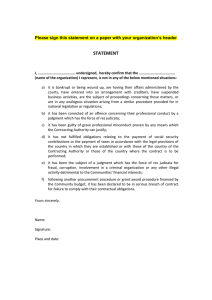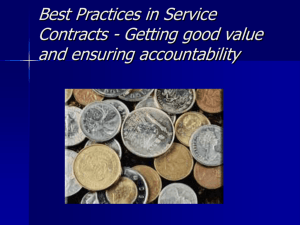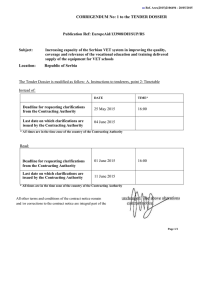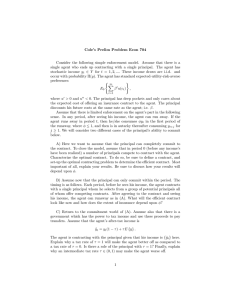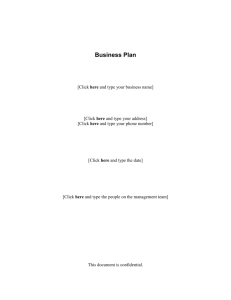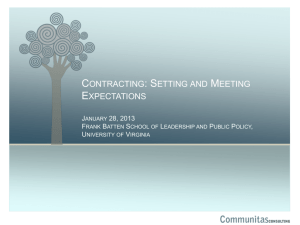Planning & Delivery Systems Construction Engineering 380 Engineering Law
advertisement
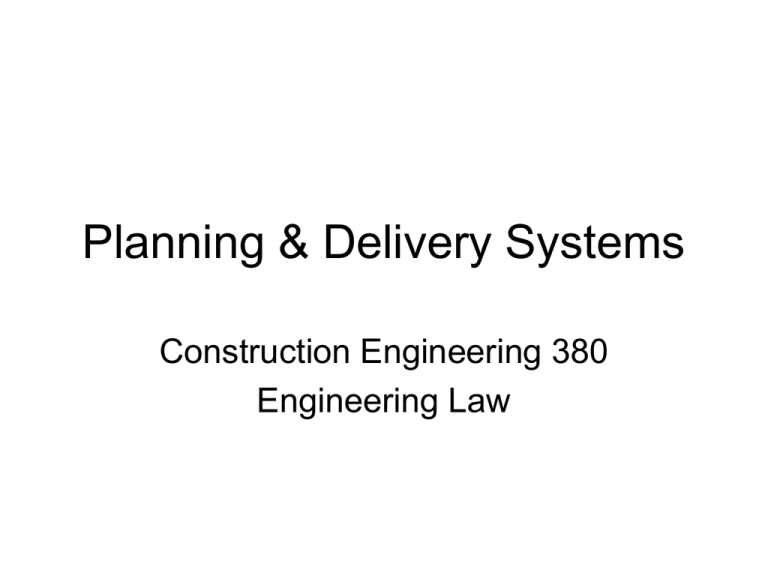
Planning & Delivery Systems Construction Engineering 380 Engineering Law Planning and Delivery • Quality, speed, and cost form the management triangle of construction (and other design and delivery systems) time time quality cost Balanced job quality cost Time constrained job Planning and Delivery • Project constraints affect choice of planning and delivery system • Business judgment, engineering judgment, and legal judgment are all involved in the management triangle, and decisions must be made with an understanding of risk, project goals, and constraints Planning and Delivery • Direct legal controls- registration, licensing, award process, standards, claims process • Indirect legal controls- loss of efficiency, contract and control ambiguity, cost of collection, risk management Planning and Delivery • Contract award – Public contracts- usually competitive bid process of some kind – Private contracts- market governed • Contract pricing – Fixed price (lump sum) • Risk is with the contractor • Contractual method for increasing price of contract • Allows owner to better plan financing IF the plans and specs are sufficiently complete & coordinated Planning and Delivery – Cost (Cost plus) contracts • Beneficial when design conditions are uncertain or incomplete • Can be a problem for financiers of the project • No incentive for designer or contractors to manage cost • Can put in a guaranteed maximum amount (G-Max or GMP) and a cost-savings split option • Jobs are usually open book • Value engineering- is a gray area because of intellectual property issues and bid-shopping Planning and Delivery – Unit price contracts • Used when material estimates are impossible or unreliable (soil excavation, remediation, asbestos) • Good for repetitive work easily categorized • How to handle “general conditions” needs to be addressed • Can be combined with other forms of contracting (for instance, LHI on development projects) Planning and Delivery – Allowances • Set a fixed amount for certain categories of work to be included in the contract but final choices have not been made (used frequently for equipment and finishes) • Variances are handled through change orders • Must spell out net vs., gross, and how shipping, OH, and other related costs are handled Planning and Delivery – Contingencies • Unallocated money set aside in a contract for uncertainties and other unforeseen (latent) conditions. Planning and Delivery • Traditional delivery – Design and construction are separated – Design-bid-build sequence – Wider range of design possibilities – (theoretically) better quality control – Contractor left out of the design process – Adversarial relationships develop – Cost “designed-in” early, hard to fix Planning and Delivery Cost of changes $ Cost of design time Planning and Delivery • Early design decision fix cost parameters and constrain subsequent decisions • Construction Management- three party contracting • Design-Build- single party contracting • Fast-tracking (design-assist) • Multiple Primes • Turnkey contracting (land, financing, eq) Planning and Delivery • Partnering and teaming – Becoming more formalized – Set goals and expectations – Develop trust and commitment to the project – Build, operate, transfer – Build, operate, own • Privately financed infrastructure • More common in lesser developed countries with insufficient capital for water systems, sanitation
